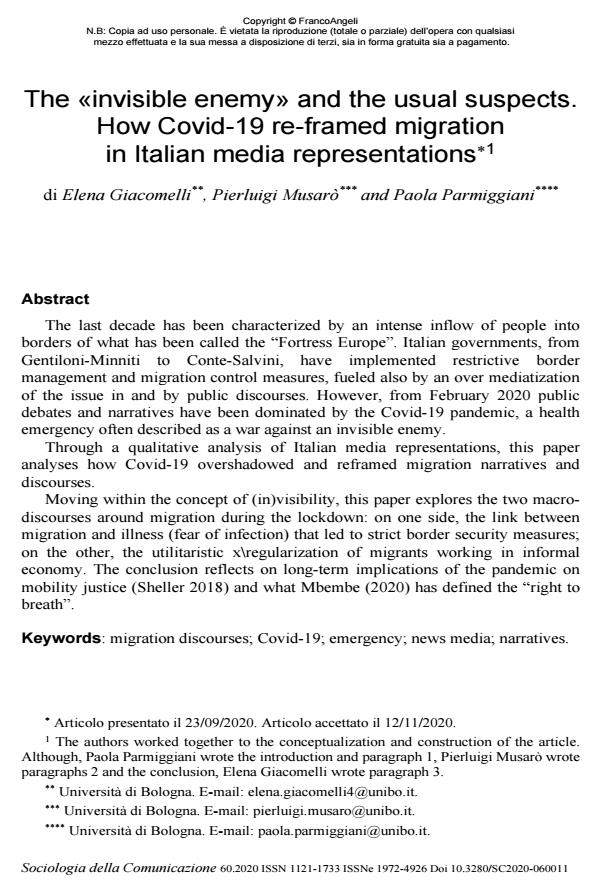The «invisible enemy» and the usual suspects. How Covid-19 re-framed migration in Italian media representations
Titolo Rivista SOCIOLOGIA DELLA COMUNICAZIONE
Autori/Curatori Elena Giacomelli, Pierluigi Musarò, Paola Parmiggiani
Anno di pubblicazione 2021 Fascicolo 2020/60
Lingua Inglese Numero pagine 18 P. 119-136 Dimensione file 242 KB
DOI 10.3280/SC2020-060011
Il DOI è il codice a barre della proprietà intellettuale: per saperne di più
clicca qui
Qui sotto puoi vedere in anteprima la prima pagina di questo articolo.
Se questo articolo ti interessa, lo puoi acquistare (e scaricare in formato pdf) seguendo le facili indicazioni per acquistare il download credit. Acquista Download Credits per scaricare questo Articolo in formato PDF

FrancoAngeli è membro della Publishers International Linking Association, Inc (PILA), associazione indipendente e non profit per facilitare (attraverso i servizi tecnologici implementati da CrossRef.org) l’accesso degli studiosi ai contenuti digitali nelle pubblicazioni professionali e scientifiche.
The last decade has been characterized by an intense inflow of people into borders of what has been called the "Fortress Europe". Italian governments, from Gentiloni-Minniti to Conte-Salvini, have implemented restrictive border management and migration control measures, fueled also by an over mediatization of the issue in and by public discourses. However, from February 2020 public debates and narratives have been dominated by the Covid-19 pandemic, a health emergency often described as a war against an invisible enemy. Through a qualitative analysis of Italian media representations, this paper analyses how Covid-19 overshadowed and reframed migration narratives and discourses. Moving within the concept of (in)visibility, this paper explores the two macrodiscourses around migration during the lockdown: on one side, the link between migration and illness (fear of infection) that led to strict border security measures; on the other, the utilitaristic x\regularization of migrants working in informal economy. The conclusion reflects on long-term implications of the pandemic on mobility justice (Sheller 2018) and what Mbembe (2020) has defined the "right to breath".
Parole chiave:Migration discourses; Covid-19; emergency; news media; narratives.
- Quarantine Ships as Spaces of Bordering: The Securitization of Migration Policy in Italy During the COVID-19 Pandemic Nicola Montagna, in International Migration Review /2024 pp.499
DOI: 10.1177/01979183231154560 - The Panicocene in Italian media. Discourse analysis of climate migration narratives Elena Giacomelli, in Journal of Information, Communication and Ethics in Society /2025
DOI: 10.1108/JICES-06-2025-0143 - The Emergence of New Street-Level Bureaucracies in Italy’s Asylum Reception System Elena Giacomelli, in Journal of Immigrant & Refugee Studies /2021 pp.272
DOI: 10.1080/15562948.2021.1939471 - Viral bodies: racialised and gendered logics in the securitisation of migration during COVID-19 in Italy Agnese Pacciardi, in Critical Studies on Security /2023 pp.176
DOI: 10.1080/21624887.2023.2248437 - Climate Mobility Justice Elena Giacomelli, Pierluigi Musarò, pp.73 (ISBN:978-3-032-07906-0)
- Da "angeli del mare" a "complici dei trafficanti": la politicizzazione del discorso sovranista contro le ONG umanitarie Dario Lucchesi, Andrea Cerase, in MONDI MIGRANTI 2/2023 pp.153
DOI: 10.3280/MM2023-002009 - Attitudes towards migrants and preferences for asylum and refugee policies before and during russian invasion of ukraine: The case of slovakia Magdalena Adamus, Matúš Grežo, in Comparative Migration Studies 44/2024
DOI: 10.1186/s40878-024-00405-z
Elena Giacomelli, Pierluigi Musarò, Paola Parmiggiani, The «invisible enemy» and the usual suspects. How Covid-19 re-framed migration in Italian media representations in "SOCIOLOGIA DELLA COMUNICAZIONE " 60/2020, pp 119-136, DOI: 10.3280/SC2020-060011